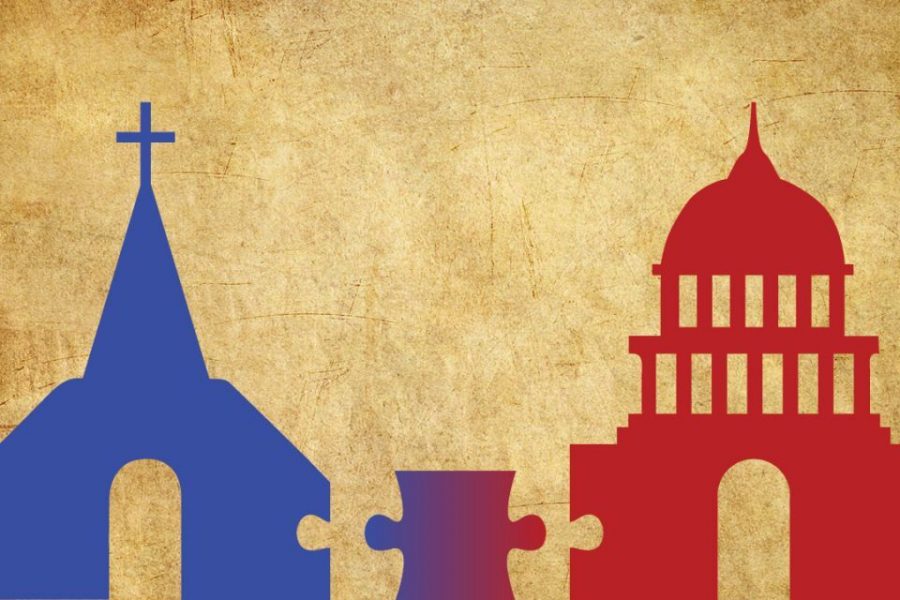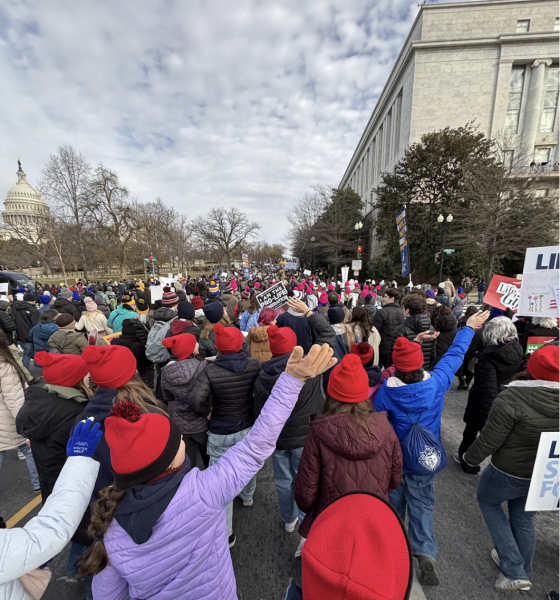The Separation of the Church and the State
A graphic illustrating the dynamic between the church and the state.
Would the founding fathers be pleased with the separation of faith and state today? The concept is simple enough: the idea of separating government from a specific religious group as well as fostering freedom of religious expression. As the Establishment Clause of the First Amendment states: “Congress shall make no law respecting an establishment of religion, or prohibiting the free exercise thereof.”
In an interview with Mark Levin for Life, Liberty & Levin, Stanford University Professor of Law (and former Tenth Circuit U.S. Court of Appeals Judge) Michael McConnell said: “The words ‘separation of church and state’ are not in the Constitution… I think this is a shorthand version of what the establishment clause means.” He went on to say that the founders wanted to protect against government “control” of religion instead and not prevent religious expression, such as religious objects on display in the public square. The founders didn’t mean that there was anything wrong with religious elements in culture, but rather that we would not have a system where the government could tell us what to believe, control churches, decide doctrines, appoint personnel, etc.
However, today more questions arise as to where the line is drawn. There have been times when this line separating the church from the state has been blurred. Laws, such as the Texas Heartbeat Bill, have many questioning how much religion is becoming involved in the government. A May 19, 2021 Texas Tribune article records that Texas Governor Greg Abbott invoked religion when he signed the bill into law. He stated: “Our creator endowed us with the right to life and yet millions of children lose their right to life every year because of abortion.” The Texas Abortion Law states that no woman can get an abortion after six weeks, or when a fetal heartbeat is detected. The law relies on private citizens to bring lawsuits against those who aid in helping a woman secure an abortion after six weeks, deputizing private citizens to pursue civil suits within four years of a post-six week abortion; and they can seek up to $10,000 in damages, even if those pursuing the suit are not directly harmed. While the law relies on the pressure of legal costs to prevent people from providing abortions after six weeks, many consider religious belief as instrumental to how the bill became law in Texas. The governor’s words at the bill’s signing affirms that religious convictions informed his support for the bill.
Controversy has also arisen concerning the denial of communion to Catholic politicians who reject the Church’s teachings on abortion. A few democratic representatives including Congresswoman Rosa DeLauro of Connecticut’s Third Congressional District and Congresswoman Alexandra Ocasio-Cortez of New York’s Fourteenth Congressional District have asked US Catholic bishops to stop weaponizing the Eucharist and using it as an argument in political discussions. The representatives even went as far as making a document on communion. An excerpt from the joint statement states: “As legislators, we too are charged with being facilitators of the Constitution which guarantees religious freedom for all Americans, in doing so, we guarantee our right to live our own lives as Catholics but also foster an America with a rich diversity of faiths.”
While news organizations reported that many US bishops have been outspoken about concerns that Catholic politicians should be held accountable for their position on pro-life issues, the National Catholic Reporter, the Vatican, and the U.S. Conference of Catholic Bishops affirmed in a document titled “The Meaning of the Eucharist in the Life of the Church,” that despite widespread speculation, there was neither a vote on banning politicians who are not pro-life from receiving the Eucharist nor was there a national policy on this matter. The bishops stated: “This was not up for vote or debate. The bishops made no decision about barring anyone from receiving Holy Communion. Each Catholic – regardless of whether they hold public office or not – is called to continual conversion, and the U.S. bishops have repeatedly emphasized the obligation of all Catholics to support human life and dignity and other fundamental principles of Catholic moral and social teaching.” Yet, clearly, Catholic leaders are divided over pro-life issues, as political and religious leaders express.
The role of Catholics and other religiously-committed individuals, such as Texas Governor Greg Abbott, acting in their civic lives is complicated. All people bring their personal beliefs into the voting booth, and politicians bring their religious principles into their legislative work as well. Yet, representatives need to find a way to represent all of the people in their districts as well as represent their own beliefs. Those who are part of religious groups also feel added pressure in leadership roles that produce public records, as their beliefs and choices come under more scrutiny than private citizens who vote in secret. The president is supposed to represent the entire nation as well.
When the founding fathers drafted and the first state legislators ratified the First Amendment, the diversity of religious beliefs was undoubtedly less than the number of religious and nonreligious perspectives that divide our culture today. The founding fathers, however, made clear that no one religion should dominate or be favored by the government. As religiously-motivated citizens and religious leaders work to influence the government to their beliefs, one wonders if the system of checks and balances and the competition of ideas is enough to ensure that a minority of those who hold a specific belief might find ways to influence the government more than the founders imagined.
Elyse Preston ‘25, Staff Writer











